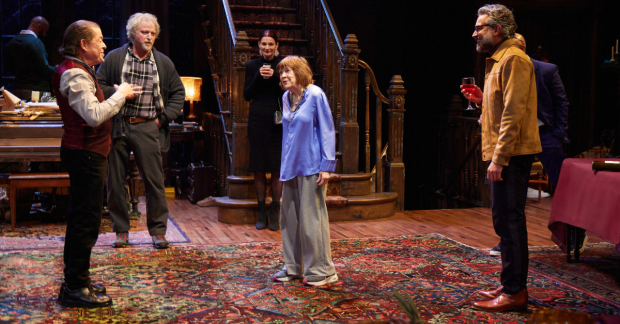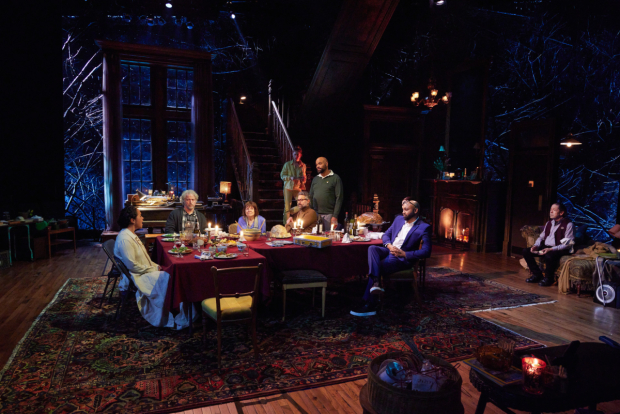Review: A Dinner Party (for What, Exactly?) Is at the Heart of a Strange and Funny Epiphany
Marylouise Burke leads a cast of quirky characters in Brian Watkins’s new play at Lincoln Center.

(© Jeremy Daniel)
What does the word "epiphany" mean to you? What about "Epiphany", with a capital E? Those are a couple of the questions that the guests of an unusual dinner party discuss in Brian Watkins's bizarre and altogether hilarious new play Epiphany, now running at Lincoln Center's Mitzi E. Newhouse Theater under the fine-tuned direction of Tyne Rafaeli.
These aren't the only questions that get asked in this existential comedy about the modern world's obsessions with technology, human isolation and loneliness, the commodification of emotions, and the sense of loss that results from overabundance. Fortunately, Watkins knows how to spread these ideas out to keep things from getting tediously heady; and the magical presence of Marylouise Burke, who tirelessly flies about the stage like a flock of wild birds, elicits a laugh at every turn along with a terrific cast who pull the comic out of this American gothic.
You'll understand what I mean by gothic when you see John Lee Beatty's impressive House of Usher-like set — the shadowy parlor of an old mansion with a long, steep staircase rising high into flies (eerie lighting by Isabella Byrd, accompanied by Daniel Kluger's ominous music and sounds, lends the scene the aura of a ghost story). This is the home of the elderly Morkan (Burke), eccentrically dressed in billowy sweatpants and silk blouse (costumes by Montana Levi Blanco). She's throwing a dinner party for a group of friends she hasn't seen in years (though most of the guests don't know each other). Snow gently falls outside as twentysomething Loren (Colby Minifie) greets them at the door.
Among them are klutzy drunk Freddy (C.J. Wilson), anxious pianist Kelly (Heather Burns), loud-talking lawyer Charlie (Francois Battiste), officious psychiatrist Sam (Omar Metwally), his wine-swilling partner, Taylor (David Ryan Smith), and dear old friend Ames (Jonathan Hadary). Amid a raucous, confused discussion about what the holiday of Epiphany (January 6) is all about and why Morkan has assembled a bunch of strangers together, the mysterious Aran (Carmen Zilles) arrives in place of the evening's guest of honor, Gabriel, a writer who has sunk into a depression and unfortunately will not make it. "He's lost his hope," Aran says, as the others stand silent.

(© Jeremy Daniel)
Epiphany is full of odd mood shifts like that, which tug us back and forth between the "real" world and the uncanny in the way that the plays of Annie Baker do. Watkins leaves us swimming in a dark pool of timelessness in which the past and present often blend — "We're in a time machine," says Charlie when he's told that the main course for dinner will be goose.
This is no accident: Those who are familiar with James Joyce's story "The Dead," which also deals with a dinner party that takes place on Epiphany (and which also features a goose), will recognize the names Morkan, Freddy, Gabriel, and others. But there's a gulf between the characters in Joyce's story, who would have known the traditional meaning of that holiday, and Watkins's characters, who do not. "How on earth does a holiday die?" asks Morkan. "We changed, ya know, the holiday didn't change, but we did."
So what about us has changed? One of the pleasures of this play is watching its characters fumble about for an answer to that question, which no one specifically asks but everyone feels, especially when Morkan demands that the guests lock their cellphones in a suitcase during dinner and talk to one another. While the conversation turns from Empiricism to the reduction of human behavior to algorithms, Burke, in a role that seems as though it was written just for her, gives an unflagging performance as Morkan and keeps things light with her impeccable comic timing (not to mention her remarkable endurance running up and down those stairs!).
Wilson, Smith, and Burns add to the hilarity with their off-hand quips and over-the-top antics. Battiste and Metwally subtly poke fun at the self-importance of their characters' professions, while Hadary takes center stage later in the play (two hours, no intermission) in a moving scene in which a song (beautifully sung by Zilles) reminds Ames of a childhood memory that shocks him back into the past — an epiphany with a lowercase e.
Throughout this curious play, laughter mingles with mystery and unanswered questions: Why has Aran been standing alone over there by the piano all this time? Why do the lights keep dimming unexpectedly? Has something catastrophic happened in the outside world when all the cellphones start buzzing inside that suitcase? We never learn the answers, and it seems we're not meant to. That last question, however, has an eerily prophetic ring as we ponder the new significance of the date January 6. We have changed, as Morkan observes, and we've never been more in need of a holiday.









